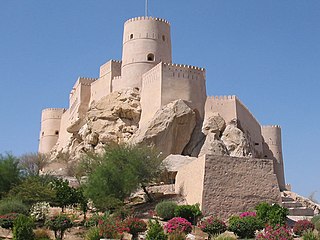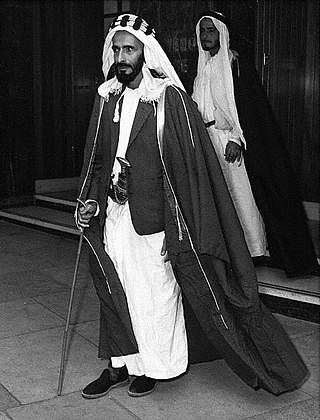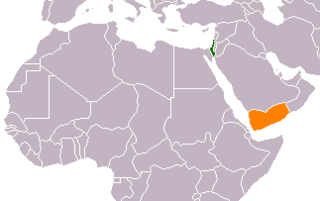A major contributor to this article appears to have a close connection with its subject.(March 2012) |

Uzi Rabi, an Israeli, is the Director of the Moshe Dayan Center for Middle Eastern Studies at Tel Aviv University. [1] [2]
A major contributor to this article appears to have a close connection with its subject.(March 2012) |

Uzi Rabi, an Israeli, is the Director of the Moshe Dayan Center for Middle Eastern Studies at Tel Aviv University. [1] [2]
On September 15, 2024, Uzi Rabi stated, with respect to the Insurgency in the North Gaza Strip, "Remove the entire civilian population from the north, and whoever remains there will be lawfully sentenced as a terrorist and subjected to a process of starvation or extermination." [3]

Oman is a site of pre-historic human habitation, stretching back over 100,000 years. The region was impacted by powerful invaders, including other Arab tribes, Portugal and Britain. Oman, at its height, held holdings that ranged from the Persian Gulf all the way south to the island of Madagascar, some notable holdings include; the island of Zanzibar, the city of Mogadishu and the city of Gwadar.

West Asia, also called Western Asia or Southwest Asia, is the westernmost region of Asia. As defined by most academics, UN bodies and other institutions, the subregion consists of Anatolia, the Arabian Peninsula, Iran, Mesopotamia, the Armenian highlands, the Levant, the island of Cyprus, the Sinai Peninsula and the South Caucasus. The region is separated from Africa by the Isthmus of Suez in Egypt, and separated from Europe by the waterways of the Turkish Straits and the watershed of the Greater Caucasus. Central Asia lies to its northeast, while South Asia lies to its east. Twelve seas surround the region (clockwise): the Aegean Sea, the Sea of Marmara, the Black Sea, the Caspian Sea, the Persian Gulf, the Gulf of Oman, the Arabian Sea, the Gulf of Aden, the Red Sea, the Gulf of Aqaba, the Gulf of Suez, and the Mediterranean Sea. West Asia contains the majority of the similarly defined Middle East. The Middle East is a political term that has changed many times depending on political and historical context while West Asia is a geographical term with more consistency. It excludes most of Egypt and the northwestern part of Turkey, and includes the southern part of the Caucasus.

Isidor "Dore" Gold is an American-Israeli political scientist and diplomat who served as Permanent Representative of Israel to the United Nations from 1997 to 1999. He is currently the President of the Jerusalem Center for Public Affairs. He was also an advisor to the former Israeli Prime Minister Ariel Sharon and to Prime Minister Benjamin Netanyahu during his first term in office. In May 2015, Netanyahu named him Director-General of the Israeli Ministry of Foreign Affairs, a position he held until October 2016.

The state of Democracy in Middle East and North Africa can be comparatively assessed according to various definitions of democracy. De jure democracies in the Middle East and North Africa are according to system of government:

Sheikh Shakhbut bin Sultan Al Nahyan was the ruler of Abu Dhabi from 1928 to 1966. On 6 August 1966, Shakhbut was deposed by members of his family with assistance from Britain in a bloodless coup. His younger brother, Zayed bin Sultan Al Nahyan succeeded him as the ruler of Abu Dhabi.

The Middle East and North Africa (MENA), also referred to as West Asia and North Africa (WANA) or South West Asia and North Africa (SWANA), is a geographic region which comprises the Middle East and North Africa together. However, it is widely considered to be a more defined and apolitical alternative to the concept of the Greater Middle East, which comprises the bulk of the Muslim world. The region has no standardized definition and groupings may vary, but the term typically includes countries like Algeria, Bahrain, Egypt, Jordan, Kuwait, Lebanon, Libya, Morocco, Oman, Qatar, Saudi Arabia, Syria, Tunisia, the UAE, and Yemen.
Cheryl A. Rubenberg was a writer and researcher specializing in the Middle East, formerly an associate professor in the department of political science at Florida International University.

The Arab states of the Persian Gulf or the Arab Gulf states refers to a group of Arab states bordering the Persian Gulf. There are seven member states of the Arab League in the region: Bahrain, Kuwait, Iraq, Oman, Qatar, Saudi Arabia, and the United Arab Emirates. Yemen is bound to the six countries of the Gulf Cooperation Council, based on history and culture.

The dynamic between the League of Arab States and the Islamic Republic of Iran has been ambivalent, owing to the latter's varying bilateral conduct with each country of the former. Iran is located on the easternmost frontier of the Arab League, which consists of 22 Arab countries and spans the bulk of the Middle East and North Africa, of which Iran is also a part. The Arab League's population is dominated by ethnic Arabs, whereas Iran's population is dominated by ethnic Persians; and while both sides have Islam as a common religion, their sects differ, with Sunnis constituting the majority in the Arab League and Shias constituting the majority in Iran. Since Iran's Islamic Revolution in 1979, the country's Shia theocracy has attempted to assert itself as the legitimate religious and political leadership of all Muslims, contesting a status that has generally been understood as belonging to Sunni-majority Saudi Arabia, where the cities of Mecca and Medina are located. This animosity, manifested in the Iran–Saudi Arabia proxy conflict, has greatly exacerbated the Shia–Sunni divide throughout the Muslim world.

The economy of the Middle East is very diverse, with national economies ranging from hydrocarbon-exporting rentiers to centralized socialist economies and free-market economies. The region is best known for oil production and export, which significantly impacts the entire region through the wealth it generates and through labor utilization. In recent years, many of the countries in the region have undertaken efforts to diversify their economies.

The Moshe Dayan Center for Middle Eastern and African Studies is an Israeli think tank based in Tel Aviv, Israel, focused on the contemporary study and analysis of the Middle East and Africa. Its stated primary mission is to serve as a resource for decision makers and the public at large, both in Israel and internationally, though it differentiates itself from other similar organizations by refraining from recommending specific policies outright.
Joseph Albert Kéchichian is a political scientist.

United States foreign policy in the Middle East has its roots in the early 19th-century Tripolitan War that occurred shortly after the 1776 establishment of the United States as an independent sovereign state, but became much more expansive in the aftermath of World War II. With the goal of preventing the Soviet Union from gaining influence in the region during the Cold War, American foreign policy saw the deliverance of extensive support in various forms to anti-communist and anti-Soviet regimes; among the top priorities for the U.S. with regards to this goal was its support for the State of Israel against its Soviet-backed neighbouring Arab countries during the peak of the Arab–Israeli conflict. The U.S. also came to replace the United Kingdom as the main security patron for Saudi Arabia as well as the other Arab states of the Persian Gulf in the 1960s and 1970s in order to ensure, among other goals, a stable flow of oil from the Persian Gulf. As of 2023, the U.S. has diplomatic relations with every country in the Middle East except for Iran, with whom relations were severed after the 1979 Islamic Revolution, and Syria, with whom relations were suspended in 2012 following the outbreak of the Syrian Civil War.

The Arab League or League of Arab States was founded by Egypt in 1945, has 22 members and seven observer members so far: Armenia, Brazil, Chad, Eritrea, Greece, Republic of India, Venezuela.

Haggai Erlich is professor emeritus at Tel Aviv University and an academic adviser at the Open University of Israel where he is the head of Middle Eastern History studies. He is the Landau Prize recipient for 2010 in African Studies.
The Arab Cold War was a political rivalry in the Arab world from the early 1950s to the late 1970s and a part of the wider Cold War. It is generally accepted that the beginning of the Arab Cold War is marked by the Egyptian revolution of 1952, which led to Gamal Abdel Nasser becoming president of Egypt in 1956. Thereafter, newly formed Arab republics, inspired by revolutionary secular nationalism and Nasser's Egypt, engaged in political rivalries with conservative traditionalist Arab monarchies, influenced by Saudi Arabia. The Iranian Revolution of 1979, and the ascension of Ayatollah Ruhollah Khomeini as leader of Iran, is widely seen as the end of this period of internal conflicts and rivalry. A new era of Arab-Iranian tensions followed, overshadowing the bitterness of intra-Arab strife.

There are no diplomatic relations that exist between Israel and Yemen and relations between the two countries are very tense. Yemen refuses the admission of people with an Israeli passport or any passport with an Israeli stamp, and the country is defined as an "enemy state" by Israeli law. During the Israel–Hamas war, the Houthi movement in Yemen launched a missile and drone striking campaign against Israel and ships in the Red Sea.

Iran and Saudi Arabia are engaged in an ongoing struggle for influence in the Middle East and other regions of the Muslim world. The two countries have provided varying degrees of support to opposing sides in nearby conflicts, including the civil wars in Syria and Yemen; and disputes in Bahrain, Lebanon, Qatar, and Iraq. The struggle also extends to disputes or broader competition in other countries globally including in West, North and East Africa, South, Central, Southeast Asia, the Balkans, and the Caucasus.
The demographics of the Middle East and North Africa (MENA) region show a highly populated, culturally diverse region spanning three continents. As of 2022, the population was around 493 million. The class, cultural, ethnic, governmental, linguistic and religious make-up of the region is highly variable.
Russia has relations with all of the countries of the Middle East. Historically it has been involved in numerous wars there, especially with Turkey and the Ottoman Empire, with Afghanistan, and recently in support of Syria. Today, when the Russian political establishment deals with Middle Eastern countries it seems to act a lot like it did in imperial times – often giving them broad diplomatic and even military support.